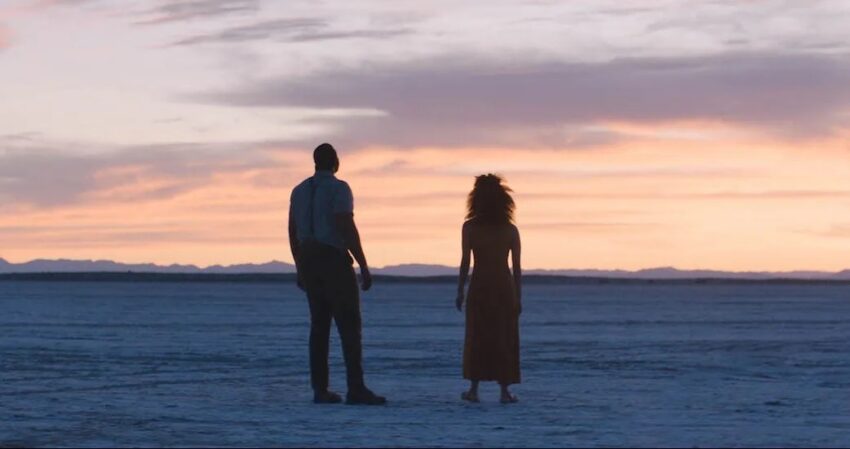Lobbying For Existence: The Melancholic Realization of Nine Days

Think of the most important interview of your life. What were the stakes? What was at risk? Odds are, they probably didn’t include the chance of being born. This is the daunting job that is at stake for a handful of unborn souls at the center of Edson Oda’s feature-length directorial debut, Nine Days. Philosophical and thought-provoking while never being too preachy or self-righteous, Nine Days follows the isolated Will (featuring a career-best from Black Panther’s Winston Duke) whose sole purpose is to evaluate unborn souls for the chance of being born. Or, as he puts it, “To be considered for the amazing opportunity of life.” Depicted as a weathered professional, Will finds himself troubled by the film’s central evaluation as it means replacing one of his favorite previously selected souls, a violin prodigy who passed away in a possible suicide.
While juggling a handful of souls interviewing for the position (role?), Will struggles to evaluate each soul fairly and without emotion while also dealing with his insurmountable loss and his buried feelings about it. More than Black Panther’s intimidating foil or Us’ comedic-relief father, Duke is a classically trained Yale graduate who has finally found a role that perfectly showcases his range and depth in Will. As the film’s titular time passes, Will plunges deeper and deeper into the depths of grief, and Duke never misses a beat by allowing the audience to recognize and understand Will’s suffering with merely a simple glance or nuanced expression. There are moments of self-pity spread out across the film as Will struggles to understand his loss and how it came to be, weaving together moments of true heartache that is nothing short of contagious. Duke doesn’t just sell Will’s heartbreak; he instills it in the viewer.
Duke isn’t the only stand-out the film has to offer. For his first feature-length, Oda has assembled an impressive roster of both seasoned character actors and up-and-coming talents to help flesh out his role-call of unborn souls. Each soul is carefully written to represent a specific type of persona, and with his impressive ensemble, Oda avoids broad strokes in developing these characters, making them multi-faceted depictions of different human psyches instead of one-dimensional incarnations of general terms such as “good” or “evil”. Each soul has a distinct purpose when it comes to showing the wide range of personalities out in the world. Emma (skillfully brought to life by a reserved Zazie Beetz) is debatably the soul most integral to the story and Will’s arc as a character as she looks onto the earth that Will shows her with a childlike sense of awe and wonder. On the other side of the coin is Kane (played by a toned-down Bill Skarsgard when compared to his Pennywise infamy), a pessimistic soul who recognizes the evil in the world and entertains the notion of combating it with additional evil. With this dichotomy of good vs. evil at play, Oda uses the handful of other souls Will interviews to showcase the wide range of personalities that fall in between these two broad virtues (with an impressive stand-out from Tony Hale playing Alexander, a particular narcissistic soul with no respect for human suffering.)
Oda walks an intricate tightrope with his writing as he balances the pivotal evaluation with Will’s inner turmoil, interweaving the two plots with astonishing deftness. These two stories within the script develop a copacetic relationship, each breathing life into the other in order to thrive and flourish. Without the help of these unborn souls, Will would be doomed, deemed to live alone in his own seclusion while anchored down by the weight of grief and loss. Unlike most first-time writers that would, Oda refuses to delve into explicit detail about the inner workings of this supernatural world he places his characters in. While this may turn off some viewers, it only helps the story at hand as it allows for it to develop organically without any interruption in the pacing. Where most fantasy/supernatural films about the afterlife (or, in this case, the before-life) would drown their audience with elaborate and convoluted pieces of exposition, Nine Days takes a step back to allow an oddly fitting sense of levity. The film is so accessible, so inherently believable because it allows for time in the sun.
The film expands on so much thought-provoking and thematic material that I believed that sticking the landing would have been impossible. To my pleasant surprise, I was wrong. Like one of Will’s favorite soul’s violin concertos, the film builds to a cathartic crescendo that weaves together all of the film’s thematic elements into something inspiring. It’s an ending that opens our eyes to the small and intricate joys of life that most take for granted. And, if evaluated with the same care that Will evaluates his souls, it’s an ending that may just change the way you live your life.


Leave a Reply